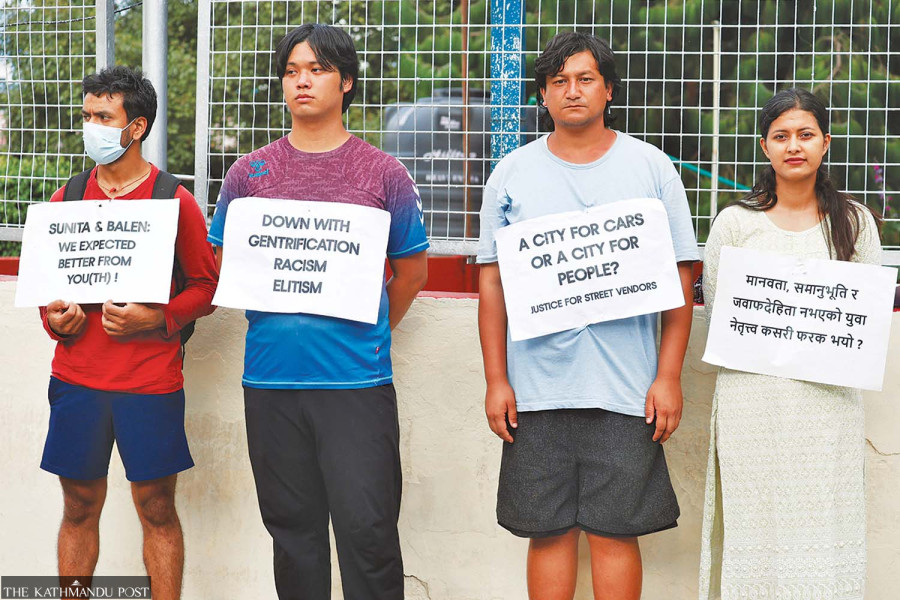Kathmandu
Calls grow for regulating street vending amid ban and protests
It is not wrong to take action against irregularity, but it should be done with proper planning and study, says urban planner Suman Meher Shrestha.
Post Report
A group of youths have been staging a demonstration in the Capital for a week now protesting against the ban on street vending. They have been asking Kathmandu Metropolitan City’s mayor, Balen Shah, to immediately address the issue.
The activists have been staging stand-in protests in front of the Rastriya Sabhagriha demanding the proper management of the footpath businesses, without disrupting the overall transportation of the city. Youth activist Ishan Shakya known as ‘Iih’ and other protesters have been demonstrating by standing continuously for hours in front of the Rastriya Sabhagriha.
While writing on social media last Tuesday when launching the stand-in protest, Iih said they want the metropolitan city to provide alternative locations and schedules so that they could continue their business. “We are calling for a compassionate, accountable and proactive governance.”
“We are not against anyone. We are just seeking answers from the local government. All we are doing is demanding accountability,” Iih said on Tuesday.
The issue has been in the debate since the start of this year.
On July 1 last year, a video on Twitter (now known as X) went viral that showed the Kathmandu municipal police forcibly seizing a corn cart from a vendor couple at Baluwatar. Since then, numerous such cases have unfolded on Kathmandu’s streets.
Then, the KMC in January this year published a notice, strictly prohibiting street vending using carts and those who sell vegetables, fruits and other items on bicycles on the roads and footpaths. The KMC notice stated that doing such business on the roadside is illegal and the City will book law violators, based on Local Government Governance Act, 2074 BS (2017) and Solid Waste Management Act, 2068 (2011).
Amid the ban and continuous crackdown on street vending continues, various sections of society have expressed their solidarity with the street vendors.
Nepali Congress General Secretary Gagan Thapa wrote on social media on Sunday that the Kathmandu Metropolitan City should soon sit for talks with the activists, including Iih.
“I have been trying to meet the Kathmandu mayor, Balen Shah, and discuss about activist Iih among others who have been staging a standing protest that is already into its sixth day,” wrote Thapa. “We should listen to everyone’s voice in democracy and if any issues have been raised in a peaceful manner, we must heed them more attentively.”
An urban planning expert, Suman Meher Shrestha, said the informal sector including street food, street vendors, and vegetable sales plays a crucial role in Nepal’s urban economy. “The Metropolitan city should give priority to management over displacement. It is not wrong to take action against irregularity, but it should be done with proper planning and study.”
According to Shrestha, the city must listen to the demands and protests and come up with the best solution.
Street-vending is also a shared concern for the city’s middle and lower middle class families, as streets are where they find affordable vegetables, fruits, groceries, clothes, second hand books, and various other goods for their daily needs.
Shrestha stresses the need for maintaining official records and gathering formal statistics on street vendors and the informal sector, so that informed decisions could be taken to manage these sectors. “All big cities in the world have embraced the informal sector. Actually, Nepal’s failure to formalise the informal sector has resulted in a significant loss of potential revenue as well.”




 17.12°C Kathmandu
17.12°C Kathmandu










